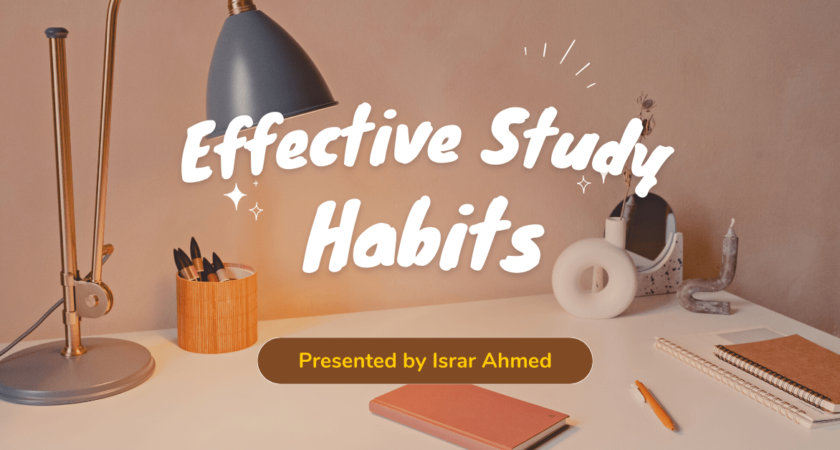Mastering the Art of Effective Study Habits
Success in academics is not merely a stroke of luck; it’s a product of diligent effort, strategic planning, and, most importantly, effective study habits. Whether you’re a seasoned student or just embarking on your educational journey, cultivating the right study habits can make all the difference in achieving your academic goals. Let’s delve deeper into the key principles of effective study habits and explore how they can pave the way for a successful learning experience.
1. Creating a Study Schedule:
One of the foundational steps toward academic success is the creation of a well-structured study schedule. The adage “failing to plan is planning to fail” holds true in the realm of education. Designate specific blocks of time for each subject, ensuring a balanced distribution of study hours. A consistent routine not only enhances discipline but also helps in better time management. Moreover, it provides a sense of stability, reducing stress and promoting a positive study environment.
2. Setting Goals:
Goals serve as guiding stars in your academic journey, providing a sense of direction and purpose. Set both short-term and long-term goals that are specific, measurable, achievable, relevant, and time-bound (SMART). Whether it’s acing a quiz next week or graduating with honors, having clear objectives will keep you motivated and focused. Goals act as checkpoints, allowing you to track your progress and celebrate your achievements along the way.
3. Active Learning Techniques:
Passive learning, like simply reading or listening, might not be as effective as actively engaging with the material. Experiment with various active learning techniques such as summarizing information in your own words, teaching concepts to a friend, or using flashcards. These methods not only enhance understanding but also contribute to long-term retention. Actively participating in the learning process transforms studying from a passive task into an interactive and dynamic experience.
4. Effective Note-Taking:
The art of effective note-taking is a skill that can significantly impact your learning experience. Experiment with various note-taking methods, such as the Cornell method or mind mapping, to find the one that suits your learning style. Capture key concepts, main ideas, and your thoughts to create a valuable resource for exam preparation. Well-organized notes not only aid in understanding complex topics but also serve as a quick reference during revision periods.
5. Avoiding Procrastination:
Procrastination is the arch-nemesis of academic success. Identify the root causes of your procrastination and implement strategies to overcome it. Break down tasks into smaller, more manageable steps, set deadlines for each, and reward yourself upon completion. The key is to start early and stay consistent. Overcoming procrastination requires a combination of self-awareness, discipline, and effective time management.
6. Creating a Distraction-Free Environment:
Your study environment plays a crucial role in concentration and productivity. Choose a quiet, well-lit space free from distractions. Silence your phone, close unnecessary tabs on your computer, and let those around you know when you need uninterrupted study time. A focused environment leads to more effective study sessions. The physical setting where you study significantly influences your ability to absorb and retain information, making it essential to create a conducive atmosphere for learning.
7. Taking Breaks:
While the temptation to power through long study sessions is common, the brain functions optimally with regular breaks. Incorporate short breaks during your study sessions to rejuvenate your mind. Use this time to stretch, take a short walk, or indulge in a quick snack. Your productivity will thank you. Breaks are not a sign of weakness; they are a strategic tool to maintain focus and prevent burnout, ensuring sustained productivity throughout your study sessions.
8. Healthy Lifestyle Habits:
The mind and body are interconnected, and a healthy body contributes to a healthy mind. Maintain a balanced diet, engage in regular physical activity, and ensure you get an adequate amount of sleep. These lifestyle habits not only boost your overall well-being but also enhance cognitive function. Adequate sleep, proper nutrition, and regular exercise provide the foundation for optimal brain function, allowing you to approach your studies with a clear and energized mind.
9. Seeking Help When Needed:
There’s no shame in seeking help when you encounter challenges. If a concept is unclear, don’t hesitate to ask questions in class or seek assistance from your teacher, classmates, or a tutor. A willingness to seek clarification demonstrates a commitment to understanding and mastering the material. Collaboration and communication are powerful tools in the learning process, enriching your educational experience and fostering a supportive academic community.
10. Reflecting and Adapting:
Reflection is a powerful tool for personal growth. Regularly assess your study habits and their effectiveness. Be open to adapting your strategies based on what works best for you. Flexibility and a willingness to refine your approach are key components of a successful learning journey. Reflecting on your progress allows you to identify areas for improvement, celebrate your successes, and continuously refine your study habits for optimal performance.
Conclusion:
In conclusion, effective study habits are the cornerstone of academic success. By incorporating these habits into your routine, you’ll not only enhance your learning experience but also pave the way for a successful academic journey. Remember, success is not a destination; it’s a journey, and the right study habits will guide you along the way. As you embark on this journey, embrace the opportunities for growth, stay resilient in the face of challenges, and celebrate the continuous pursuit of knowledge. Your success is not just a destination; it’s a reflection of your dedication, discipline, and the effective study habits you cultivate along the way.

